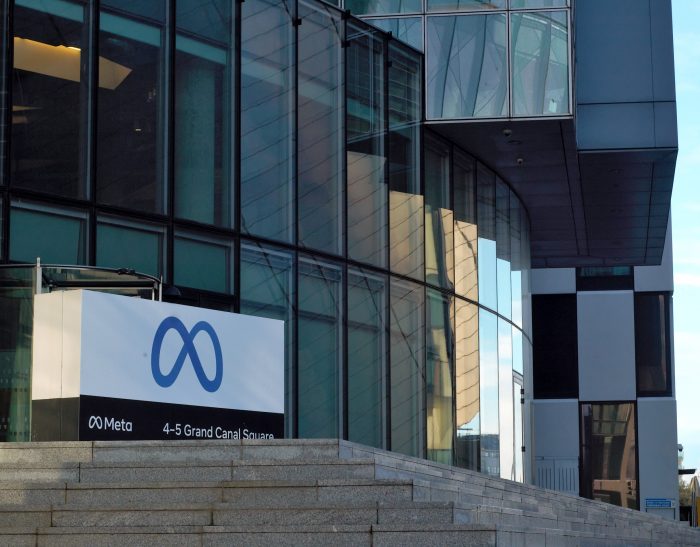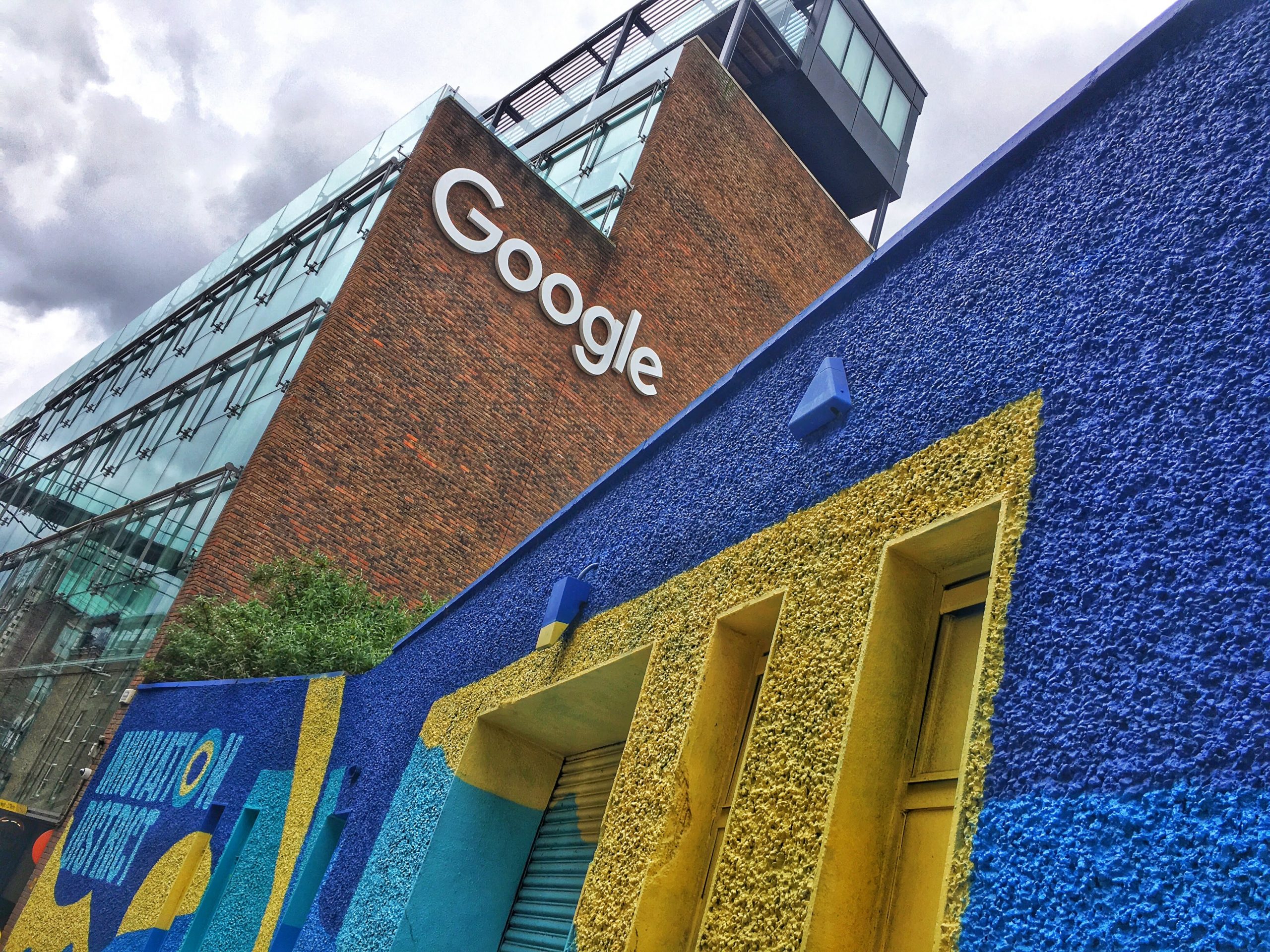Meta and Google are two of the software-based multinationals with the largest workforces in Ireland. They are both dependent on online advertising, one of the sectors of the digital economy most exposed to the peaks and troughs triggered by Covid-19 and the recent spike in global inflation. And dozens of new company documents have just become available from Irish subsidiaries of both groups, allowing a comparison of their respective fortunes in this volatile environment.
The most immediate difference between Meta and Google is that the parent company of Facebook, Instagram and WhatsApp has announced mass layoffs, while the leading search engine and owner of YouTube has not.
When The Currency visited its Google Dock international headquarters in Dublin earlier this month, the 13-storey building was buzzing with positive activity and the organiser of the meeting complained of the difficulty in finding a meeting room. But there is no guarantee that Google will remain immune to the ongoing wave of tech layoffs, with the Silicon Valley news website The Information reporting the imminent implementation of a performance management system that could identify 10,000 less efficient workers in case any are let go.
Within Ireland, we now have detailed figures for the operations and performance of Meta and Google’s offices in Dublin and Cork for 2021 as well as indications for this year. They reveal past decisions at both firms, the value their Irish bases bring to each wider group and the potential impact on employment and tax revenue here if either was to impose cuts.
*****
Meta announced three weeks ago that it was slashing its global workforce and shrinking its office space, including in Dublin, though this was after growing employee numbers faster than ever in the previous two years. Much of this hiring spree occurred in 2021, when the group expanded from 58,604 to 71,970.
Yet the latest figures show that its recruitment in Ireland was much slower, with only 300 direct employees added to the 12 Meta subsidiaries tracked by The Currency in this country. The group’s pace of hiring here was only half what it was globally last year.
Some new employees are more directly exposed to the layoffs, which have yet to be detailed in Ireland. Meta’s decision in September to end its Novi crypto-currency wallet project (previously known as Calibra) means the end of the road for the dedicated Dublin subsidiary Novi Financial Ireland, which had grown from 24 to 102 employees last year.
Overall, the 13 per cent cut in Meta’s workforce announced by its chief executive Mark Zuckerberg, if applied evenly in Ireland, would amount to a reversal of last year’s expansion.
The caveat is that figures reported by group companies when hiring and firing cover only direct employees, with cuts impossible to track among contractors employing at least as many staff as some of their clients like Meta or Google.
Still, the chart above shows that Google was a lot more conservative in its recruitment last year. Figures reported by the group’s ultimate parent Alphabet in the US show that its workforce grew from 135,301 to 156,500 in 2021. This is a slower pace than Meta’s.
Then in Ireland, the number of direct employees reported by 22 Irish Google group companies together actually decreased marginally last year, from 4,470 to 4,386. If there was excessive hiring at Google anywhere in the world during the pandemic-induced online boom, it doesn’t appear to have taken place here.
The large workforces established by both digital multinationals in Ireland is justified by the volume of international business they have based in this country. This business mostly involves processing sales made in other countries in Dublin, so that the resulting revenue and profits are booked and taxed in Ireland. This is reflected in the fact that over 80 per cent of Irish-based staff in both groups are employed in sales, marketing and administration, with fewer than one in five working in technology-related jobs.
Each group’s main trading company in this country, Meta Platforms Ireland and Google Ireland, performs this task as international advertising sales centre. They are directly comparable:
- Both raise revenue from online advertising only – especially since Google separated sales of paid-for services, such as Google Workspace and Classroom, into a new Irish subsidiary called Google Cloud EMEA during 2021;
- Both focus on this function and pay other group companies for access to the technology powering their business, without owning intellectual property themselves;
- They both employ around 90 per cent of their group’s workforce in Ireland; and
- They both return the profits from this sales centre function as dividends distributed to their respective groups, after paying corporation tax in Ireland.
So, how well have these core Irish subsidiaries performed for each of Meta and Google?
Revenue rose significantly at both Meta Platforms Ireland (28.9 per cent) and Google Ireland (33.8 per cent) last year. Yet not only is Google’s performance slightly better, it is also from a higher base, and it is artifically dampened by the diversion of $2.3 billion worth of cloud services revenue into its new separate subsidiary last year.
Most of this revenue from advertising sales is re-routed to other group companies under payments for the use of intellectual property that are not detailed in accounts filed in Ireland. Meta Platforms Ireland had €48.5 billion in “administrative expenses” last year, of which only €425 million was explained by payroll costs – arguably its largest administrative expense inside this country.
This administrative expenses line increased to remain at 93 per cent of revenue in both 2020 and 2021. The bulk of Meta Platforms Ireland’s spending is evidently in the form of tens of billions of euro in payments calculated as a proportion of its revenue for the use of intellectual property, which we know is now owned by US group companies.
A similar transfer pricing arrangement emerges from the accounts of Google Ireland, which had €47.8 billion euro in “administrative expenses”, of which the largest disclosed in Ireland was €799.2 million in payroll costs. Nearly all of the other €47 billion can be assumed to have been paid to intellectual property holding companies. This figure, just like Meta’s, appears to track revenue, hovering around a 70 per cent share for the past two years.
This left Meta Platforms Ireland with an operating profit of €1.3 billion last year, half of Google Ireland’s €2.8 billion. As neither company has any significant debt, these are equivalent to their taxable profits.
While the gap has been narrowing between the profit margins returned by Meta and Google on advertising sales booked in Ireland, Google Ireland remains nearly twice as profitable as Meta Platforms Ireland.
This is also true when margins are divided by the number of employees, though less prominently last year.
Were these crude financial metrics to decide the fate of employees, those at both Meta Platforms Ireland and Google Ireland could argue that they have delivered strong performance. Meta’s have increased profits per worker, and Google’s have seen a slight decrease from a much higher base while their team shrunk marginally last year.
It is unclear, however, how much of the level of profit posted by the sales centre of each group is attributable to the skills of the workers based here. The thinking behind Zuckerberg’s layoffs announcement was that Meta needs to refocus on technology development – preserving the jobs of US-based engineers paid through the tens of billions of euro in undisclosed “administrative expenses” flowing out of Ireland each year.
The tax advantage Ireland offers (and would continue to offer under the slow-moving OECD-brokered global agreement) seems to provide stronger protection for the majority of sales and administrative jobs in Meta and Google’s Irish operations. Both groups need to continue processing sales here to justify the continued booking of resulting profits in this country.
Tax settlements and compliance fines
Last year, Meta Platforms Ireland declared a tax charge of nearly €700 million. This included a once-off settlement of €212.3 million “recognised in respect of these years and other prior tax years”. Other Irish companies in the group pushed Meta’s tax bill here to €722.5 million.
The social media group also booked additional provisions for expected compliance fines as regulators in jurisdictions including the EU and Ireland continue to investigate its use of personal data. Meta Platforms Ireland tripled the funds set aside for this to €3 billion, while a similar provision at WhatsApp Ireland remained virtually unchanged at €238.8 million.
Google, meanwhile, had already settled past tax bills last year and Google Ireland ended last year with a relatively smaller corporation tax liability of €395.9 million. However, Google is different from Meta in that not all the “administrative expenses” for the use of group intellectual property leave the country immediately.
One Irish subsidiary, Google Europe International Technology, generated $3.5 billion in revenue last year “from royalty income for providing intellectual property rights to other group undertakings”. It owns a portion of the technology rights used by Google to make sales out of Ireland, and amortises over $600 million of their value against its Irish profit each year.
In 2021, Google Europe International Technology used the full advantage of this tax deduction for the last time. There was only $315.2 million worth of intellectual property left to amortise on its books at the end of the year. For now, this left the company with a $526.6 million tax bill.
Overall, Google group companies in Ireland declared tax charges totalling €933.4 million last year. As a comparison, this number, while substantial, remains three times lower than that reported earlier by companies in the Microsoft group.
The final measure of the value generated in Ireland for Meta and Google is the dividends paid out of the country. Last year was the first full one under new ownership structures established by both to cut out the Caribbean intermediary holding companies that previously operated the so-called double Irish tax scheme.

Meta Platforms Ireland did not pay any dividends during 2021, but started distributing profits as the digital economy began to sway earlier this year. On May 31, it paid a $2.7 billion dividend to its immediate Irish parent, Facebook International Operations, which in turn sent $2.4 billion of this home to the US. By the time directors signed off on more filings on October 26, Meta’s Dublin trading company had distributed another $700 million, bringing the total this year to date to $3.4 billion.
Google Ireland, meanwhile, paid a €3 billion dividend last year. Its immediate parent in Ireland held on to most of this cash and transferred €700 million of it to the US. In addition, the Irish-based intellectual property holding company Google Europe International Technology paid dividends of $3.4 billion last year and $780 million this year to its US parent. Overall, Google’s two main Irish subsidiaries have paid the equivalent of €6.7 billion in dividends, of which they distributed €4.4 billion out of the country.
This completes the picture of a more prudent Google, which has been hoarding cash within Ireland after expanding its workforce here less rapidly than Meta. Zuckerberg’s group’s meanwhile, has been pulling dividends out of profits accumulated in Ireland since the wheels started coming off the online advertising growth wagon this year, after hiring massively around the world – but not as much in Ireland.
Combined with the need to maintain a sizeable sales centre in Ireland to continue routing taxable profits here, this pleads in favour of leniency towards Irish-based workers if or when either of Meta or Google make decisions to cut jobs.
This, however, doesn’t take into account deeper strategic choices around which skills to protect or sacrifice when tightening screws, or more irrational aspects in a stock market where swinging cuts appear to have replaced quarterly hiring increases as the must-have slide to show at investor roadshows.
Further reading
Sean Keyes: What’s roiling the technology industry?
Stephen Kinsella: Big Tech, small country – and not a time to play Chicken Little


